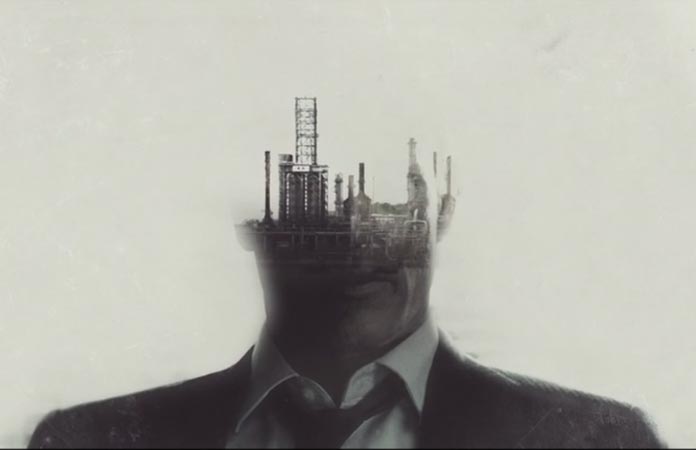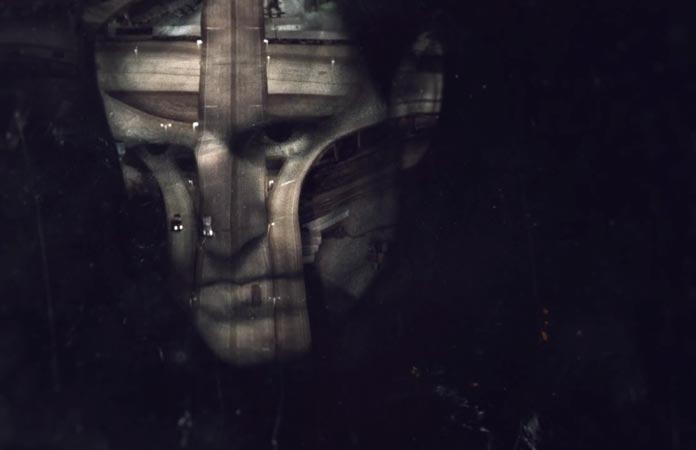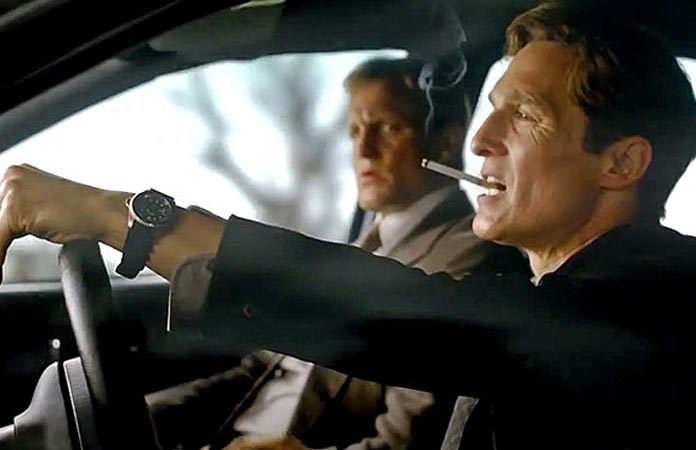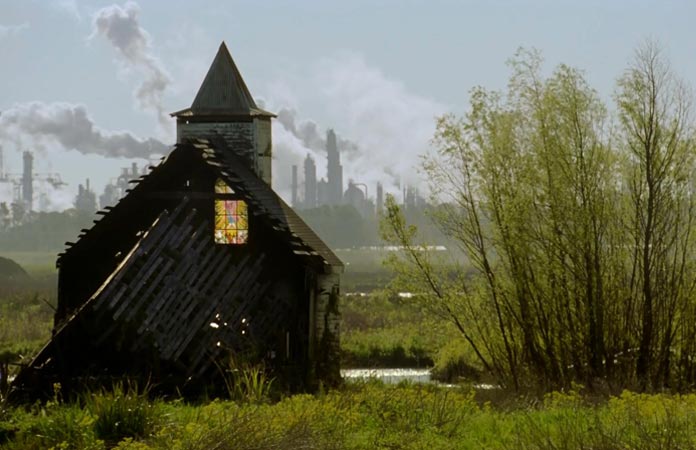True Detective: “This place is like someone’s memory of a town, and the memory is fading”
Published on February 28th, 2014 in: Current Faves, TV |By Luke Shaw
I’m increasingly wary of new TV recommendations, especially after the all that post-meth cook smoke was blown up so many collective asses that it got tiresome to even be involved in the show’s culture (Disclaimer: I like Breaking Bad but it isn’t the be all and end all of TV drama). It’s also because to even participate in conversations around that show without either being buffeted by so much screeching enthusiasm or labeled a disgruntled naysayer for having one bad word to say about any of its many elements was an absolute impossibility. So I tend to try and distance myself from the new stuff.
However, HBO have gone and put out something that piqued my intrigue so much that I just couldn’t stay away. So I am going to spend the next couple of hundred words blowing smoke up the collective asses of those of you who read this. I love the series format on TV, though I often regret the time investment, especially considering the way it’s frequently so reliant on commissioning and meeting episode quotas. It often feels like creators are wrestling with network and fan expectations and thus things pan out in uneven and bizarre ways. Sometimes this is good (it was great to see Jesse’s character evolved into a fuller role in Breaking Bad than showrunner Vince Gilligan had intended) and sometimes this is bad (cancellation of shows like Deadwood, shows being dragged on past their sell by date like The X-Files and many others). It’s an obstacle that few shows can guarantee that they can surmount.
True Detective is a familiar beast, but of different breeding. It has this prestigious idea of “authorship” behind it. It has a fixed writer with novelist Nic Pizzolatto and a fixed director in Cary Joji Fukunaga. It has brevity, with the first season being only eight episodes long, It has closure and finality; the show adheres to the anthology format so each season will be about a different scenario, with new faces, possible new locations. None of these are entirely new ideas, but the combination of all of these elements into one show is novel, to me at least. I may have missed a show; with millions of hours of TV it is entirely possible that I have, but that’s a task I can set myself later, with American Horror Story looking like an admirable starting point.
This unique creative freedom has made True Detective truly intoxicating, and it feels more akin to a novel than a regular TV show. The first episode was the epitome of a slow burn, an hour of TV where nothing really happens. It set a good precedent, too, because up until the end of the fourth episode nothing happens at all. This show is not about bombast; it’s about the creeping, fusty, oppressive, weirdness of a killing with cult overtones in deep Louisiana.
Tasked with the case are detectives Rustin “Rust” Cohle (Matthew McConaughey) and Martin “Marty” Hart (Woody Harrelson) a typical odd-couple pairing of Louisiana family man/salt of the earth detective Hart with Texan scenery-chewing intellectual/misanthropic philosopher Cohle. Rust and Marty snipe at each other as they both predictably step on each others’ toes, trading quips and put downs—
Marty: “I’ve noticed you have a tendency towards myopia, tunnel vision… it blows investigations…it’s obsessive.”
Rust: “So are you, just not about the job.”
—and sizzling with the kind of chemistry all great TV duos require. They gnaw and bite at each other as we get into their heads from two disparate angles provided by the show’s two framings.
Centering primarily on their exploits from 1995-2002, Cohle and Hart are also being interviewed in 2012, telling their own versions of events as kind of pseudo voiceovers, making for interesting juxtapositions between the truth and the biased recollections of worn down and mutated men twenty years later. And Men are ostensibly the thing here; ths is a show by men about men. It’s Noir, and it makes no forgiveness for this, which has rankled more than a few people.
Women are presented only as story elements: they’re DBs, wives, prostitutes, and mistresses. It’s a concession to the genre, which could be a weakness if this wasn’t such a damn effective blend of Southern Gothic and Noir. The women are out of the spotlight here for that reason, but the show is in part about the failings of this Southern Men’s world and the ways in which it treats them, the focus of the show being the underlying disease behind the symptoms of poor female characterization. It’s not uncommon in the fiction that inspired it, either; paid writers and unpaid writers have been quick to forge comprehensive lists of books that influence or link into the shows ideas, and I’ll leave you to Google them to elucidate yourself on them, but offhand the list is essentially The Black Dahlia, The King in Yellow, The Conspiracy Against the Human Race, and also worth mention here is Pizzolatto’s own Galveston, a novel with an allegedly similar premise.
Rust spouts stereotypically first year pseudo-philosophy in a wholly inimitable way. He’s going to fill the 30 percent personality quota of all those folks who end up absorbing media into themselves in that way, and whilst that’ll make for some tiresome conversations at parties, it doesn’t stop McConaughey from getting to chew up the scenery with his Texan drawl, barely audible against the background of ominous music and burning cigarette butts. He’s an impossible character, a detective that’s more a force of nature and unnatural justice than of man’s law, entirely the kind of centerpiece you’d expect from such a show. Flawed in his machine-like integrity, he’s the guy you want to be.
Hart is the foil: a philandering bruiser who just needs to wind down from the job with a few shots of bourbon and some girl who looks like his wife, but younger, prettier, more throwaway, more HBO T&A policy-friendly. These character tropes loom large over the show and it’s a testament to the vision and the subsequent handling of it that it doesn’t really suffer for it at all. Age old conversations and investigations are rolled out on wheels still shiny from the last thousand times they were utilized in the past decade, but the actors behind them are putting in exceptional performances and the show knows you know about this and is instead happy to deliver something a little more cerebral than a simple killer of the week setup.
The intense focus on just one case over such a long period of time (eight episodes at just under an hour each) gives the show its own obsessive tunnel vision, but just like Rust’s it’s not without merit. It gives the show a substantial feeling that each episode is going to be something of substance and importance. Watching and knowing full well that the arcs it conjures up for characters and events are things that are going to be dealt with sufficiently, and being safe in the knowledge that it will end at some defined point removes that terrible feeling that it’s going to overstretch things and add in new elements just to keep people happy. Being given carte blanche means things can get weird at times: shots are held for longer than any director would usually care for. Details and characterizations come to the fore in a way that is unfamiliar; rewards for re-watching and personal investigation are here simply because as an audience people can be confident that things will finish, which means events and themes can have meaning without a studio executive concerned with ratings abruptly cutting or lengthening a show to dull or obfuscate a writer’s plans.
That’s not to say prior TV has entirely failed in this respect. The Sopranos managed admirably, even Battlestar Galactica had themes writ large through the entire show that were recurring, but such directorial control and authorship is a rarity, and it imbues True Detective with a kind of cinematic poignancy that allows it to delve deep into its mythos and atmosphere and dredge its swamps for tantalizing morsels of ideas that aren’t threatened by the potentially hazy future of the show. Even if that future does become suspect, season one will be done, out, complete, and whole, even if season two fails and seasons three or four don’t come around.
To me, that’s an incredibly exciting prospect; it’s a narrative structure I find appealing. I don’t need to worry about the competence of a writer to “sketch in” the middle of a plot, or fill the episode-to-episode running time with subpar material, or to make storylines redundant because the show’s demands are elsewhere. Nor do I need to worry about the crew’s necessity to insert a godawful “Marie shoplifts!” piece of bullshit—because god maybe knows why that exists.
It’s taut and lean. It’s plotted and paced with a clockwork accuracy that is telling in the show’s delivery. Very few things happen that are of individual note primarily because everything is important. Each scene is weighted and tied effectively into the plot, and even though that plot is to an extent fairly transparent in its machinations and motives, it’s incredibly effective due to the way it’s told, which is precisely in my mind what every show and film and novel of this kind should be aiming for: proficiency and eloquence in the delivery of narrative above the novelty of the narrative itself. It, of course, helps that it is exquisitely shot, with some utterly standout moments including one incredibly effective single shot action sequence along with bizarre mythologizing of various characters in shots that make them seem entirely alien, including an effective scene reminiscent of Sasquatch footage that’ll make your skin crawl.
The show and all its artistry feels so textural, existing in a green, post-Hurricane Andrew, rotting mildewed, wonderland of noir fantasy and drug induced nihilistic philosophy. It’s a hash of many familiar elements that probably shouldn’t work as well as it does, but it certainly lives up to the hype I’d heard around it. True Detective, along with Hannibal, are shows that are uncompromising with their personal direction, so much so that I’m actually excited for new TV again.
My back catalogue is full of holes the shape of The Sopranos season four and onwards, but for the time being the lavish, dark fantasy of True Detective has been enough to entirely rekindle my passion towards what TV can achieve with a narrative, and the way we’re still watching a medium evolve and experiment with its form so evocatively.




Time limit is exhausted. Please reload the CAPTCHA.